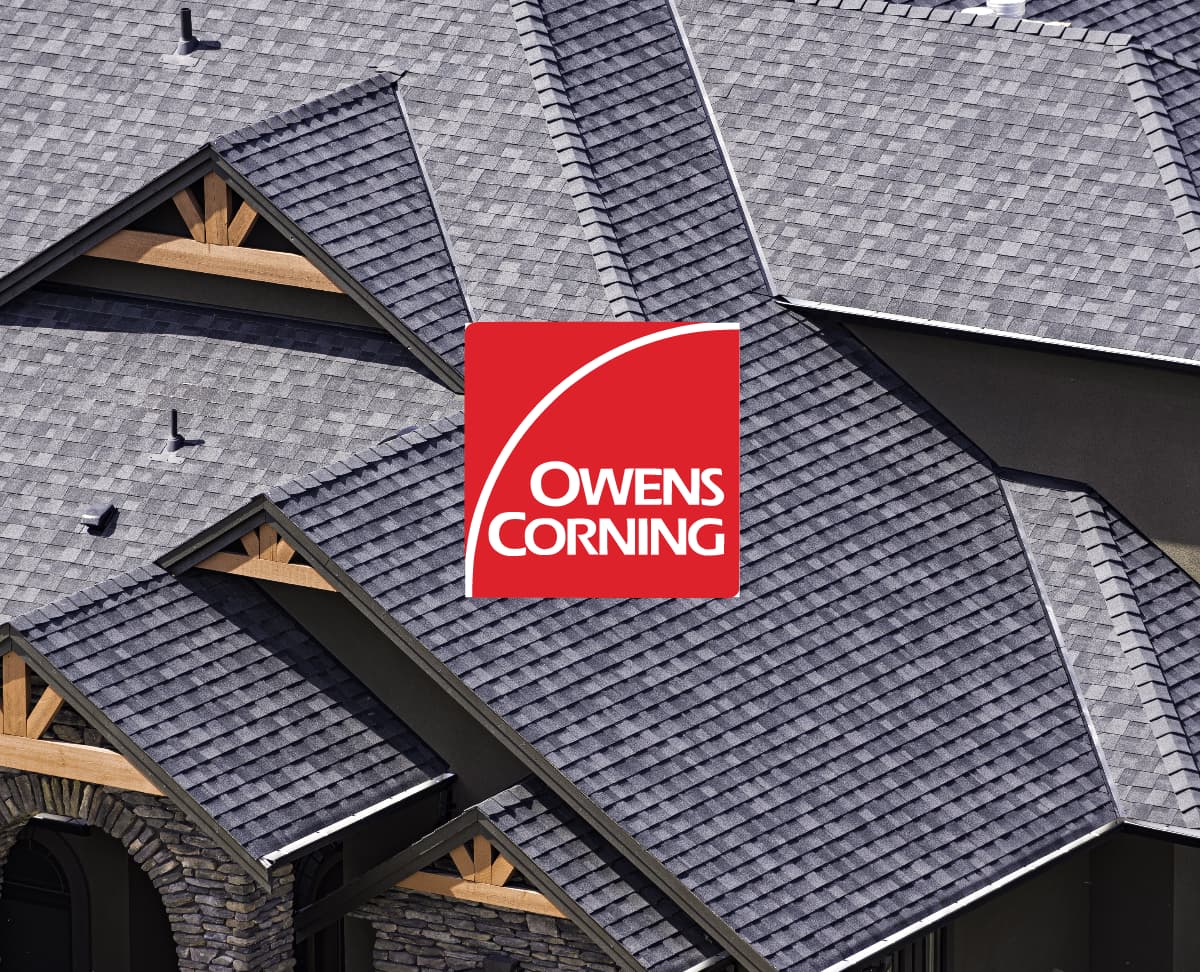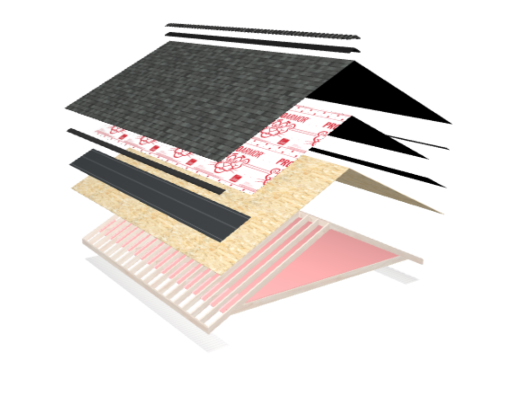
Roofing Materials
Roofsmith Restoration is an Owens Corning® Platinum Preferred Contractor
At Roofsmith Restoration, our teams are skilled in all types of roofing materials, including all Owens Corning roofing systems.
We recommend Owens Corning roofing products for their reliability and excellent performance. Plus, all Owens Corning roofing systems are backed by outstanding warranties.
We have years of roofing experience, and we trust Owens Corning. You can, too. Talk to our team about your roof repair or roof replacement, and we’ll help you find the right system for your home.
By scheduling your free inspection with Roofsmith Restoration, you’ll have one of our professional roofers assess your roof and offer you a free estimate for costs for residential roof repair or residential roof replacement.


Work with a Platinum Preferred Contractor
There are many benefits to working with an Owens Corning Platinum Preferred Contractor: our familiarity with the products, our expertise and our commitment to high safety standards. We’re proud to be part of the top tier of roofing contractors as recognized by Owens Corning, one of the most trusted names in roofing products.
All of our teams are trained by us, in our facility, so we can guarantee their skill level. We complete training through Owens Corning University, educational opportunities only offered to Owens Corning Roofing Contractor Network members.
We’re also Top of the House Certified, a SureNail Technology Trained Contractor and a Total Protection Roofing System Trained Contractor with Owens Corning.

Owens Corning Products
Seal
The Owens Corning ice and water barrier protects your roof where water has a tendency to collect or flow. The synthetic underlayment provides a water-shedding barrier under the shingles that guards from wind-driven rain.
Defend
Three types of shingles help secure your roof. Starter shingles ensure a straight edge and are effective in sealing along eaves and rake. Laminate shingles provide protection and curb appeal, available in many colors and styles. Hip and ridge shingles offer extra protection and style.
Breathe
Intake vents and exhaust vents help protect interior roofing components from heat and moisture.

To learn more about high-quality Owens Corning roofing systems, talk to a Roofsmith Restoration team member.
#faqs
Frequently Asked Questions
Have Question? We are here to help
What are the different roofing materials available, and how do I choose the right one for my home?
Roofing materials such as asphalt shingles, metal, clay or concrete tiles, wood shingles or shakes, slate, and synthetic options offer various advantages and considerations. Factors to consider when choosing the right roofing material for your home include budget, aesthetic preferences, durability, and maintenance requirements. Asphalt shingles are affordable and easy to maintain, metal roofs are durable and resistant to elements, clay or concrete tiles offer fire resistance and longevity, wood shingles provide a natural look but require regular maintenance, slate is a high-end option known for longevity, and synthetic alternatives mimic traditional materials.
What are the advantages and disadvantages of various roofing materials?
Here are the advantages and disadvantages of various roofing materials:
- Asphalt shingles are affordable and easy to install, but they are less durable.
- Metal roofing is durable, lightweight, and energy-efficient, but it has a higher upfront cost.
- Clay or concrete tiles provide a classic look and are fire-resistant, but they are heavy and can be expensive.
- Wood shingles or shakes have a natural look but require regular maintenance and are susceptible to rot and pests.
- Slate roofing is long-lasting and elegant but is expensive and heavy.
How do roofing materials affect the overall appearance and curb appeal of my home?
Roofing materials greatly impact the overall appearance and curb appeal of your home. Asphalt shingles provide a traditional look, while metal roofs offer a modern or industrial style. Clay or concrete tiles create a timeless and elegant appearance, and wood shingles or shakes give a rustic and charming look. Slate roofs provide a sophisticated and luxurious finish. It is important to choose a roofing material that complements your home's architectural style and exterior to achieve a cohesive and attractive appearance.
Are there specific roofing materials that are more suitable for my climate in Cleveland, Ohio?
For the climate in Cleveland, Ohio, suitable roofing materials include asphalt shingles, metal roofing, clay or concrete tiles, and certain synthetic options. Asphalt shingles are popular and can withstand temperature fluctuations. Metal roofs handle snow and ice well. Clay or concrete tiles offer good insulation and durability, while some synthetic options mimic traditional materials. Consulting with local roofing professionals is recommended for expert advice.
What is the expected lifespan of different roofing materials, and how does it impact long-term costs?
Is there a significant difference in cost between various roofing materials?
There is a significant difference in cost between different roofing materials. Asphalt shingles are the most affordable, followed by wood shingles or shakes, metal roofing, clay or concrete tiles, and slate, which is the most expensive. The cost can vary depending on factors such as material type, quality, durability, and location. It is advisable to consider both the upfront cost and long-term durability when making a decision.
Are certain roofing materials more energy-efficient and capable of lowering energy bills?
Certain roofing materials, such as metal, clay or concrete tiles, and slate can be more energy-efficient and contribute to lower energy bills. Metal roofs reflect solar heat, clay or concrete tiles provide natural thermal resistance, and slate roofs offer insulation properties. "Cool roofs" with high reflectance and emittance can also decrease cooling costs. Energy efficiency is influenced by factors like insulation, ventilation, and installation quality. Consulting with roofing professionals can provide tailored guidance for your specific location and needs.
Can I customize the appearance of my roof with different colors and styles of roofing materials?
Yes, you can customize the appearance of your roof with different colors and styles of roofing materials. Many roofing materials, such as asphalt shingles, metal panels, and clay or concrete tiles, come in a wide range of colors and finishes to suit your preferences. This allows you to choose a roofing material that complements the overall design and aesthetic of your home. Some materials even offer options for different styles, such as architectural or designer shingles, which can add more dimension and visual interest to your roof. Keep in mind that customization options may vary depending on the specific roofing material and manufacturer. It's recommended to consult with roofing professionals or refer to product catalogs to explore the available customization choices for your desired roofing material.
Do different roofing materials require specific maintenance or care?
How do roofing materials perform in extreme weather conditions, such as heavy rain, snow, or hail?
Different roofing materials perform differently in extreme weather conditions. Asphalt shingles are common in residential properties and handle heavy rain and snow reasonably well. However, they can be damaged in extremely windy conditions and by hail. Metal roofing is highly durable and can withstand heavy rain, snow, and hail. Clay and concrete tiles also perform well in heavy rain and snow, but can be more prone to breakage from hail. Slate roofs are highly durable and resistant to heavy rain, snow, and hail.
Are some roofing materials more environmentally friendly and sustainable?
Certain roofing materials are more environmentally friendly and sustainable than others. Metal roofing is often made from recycled materials and can be recycled again at the end of its lifespan. Clay or concrete tiles are made from natural materials and can have a long lifespan. Wood shingles or shakes can be sourced from sustainable forests. Cool roofs, designed to reflect sunlight and reduce heat absorption, can lower energy use. However, sustainability also depends on factors such as manufacturing processes and proper disposal.
Can Roofsmith Restoration provide samples or examples of roofing materials for me to see in person?
Is there a particular roofing material that is fire-resistant or more fire-safe?
Certain roofing materials are more fire-resistant or fire-safe than others. Metal roofing is naturally non-combustible and helps protect against the spread of fire. Some asphalt shingles have a Class A fire rating, indicating a high level of fire protection. Clay and concrete tiles are inherently fire-resistant and can help prevent the spread of flames. It's important to consult local building codes and regulations and ensure proper installation and maintenance for fire-safety.
Are some roofing materials more resistant to pests, such as insects or rodents?
Certain roofing materials are more resistant to pests, such as insects or rodents. Metal roofing does not provide a food source for pests and has tight fittings that prevent entry. Concrete or clay tiles are less attractive to pests and can create a challenging barrier. Synthetic roofing materials are also less susceptible to pest damage. Wood shingles or shakes can be treated with chemicals to deter pests, but effectiveness may decrease over time. Proper installation, maintenance, and addressing existing pest issues are important regardless of the roofing material used.
Can I upgrade the insulation or ventilation of my home along with a new roofing material?
Upgrade insulation and ventilation with a new roofing material to improve energy efficiency, comfort, and indoor air quality.
Does the choice of roofing material affect the weight and structural requirements of my home?
Roofing material choice affects the weight and structural requirements of your home. Different materials have varying weights, with asphalt shingles being lightweight, metal roofing being generally lightweight but some types requiring additional support, and clay or concrete tiles being heavier and potentially requiring reinforced framing or engineering consultation. Professional guidance ensures the safety and durability of your roof.






